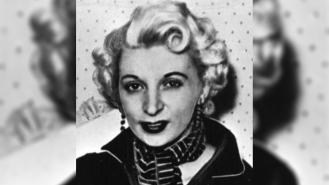
4 British women who were hanged
From the inexplicable killing of a teenage boy to the nightclub hostess who shot dead her lover in public, these four British women faced the ultimate punishment for their crimes.
1. Susan Newell
Susan Newell was the last woman to be hanged in Scotland. One June day in 1923, 13-year-old newspaper delivery boy John Johnston went missing in Coatbridge, just east of Glasgow. The next day, Susan – a young wife and mother known for her fiery temper – was spotted on the streets, pushing about a bundle in an old cart.
Suspicion was soon aroused, and the mysterious bundle was revealed to be the body of the dead paperboy. He had been assaulted and strangled, for reasons that have never been fully understood. At trial, Susan’s conviction was partly secured by her daughter, who testified she’d come home from playing outside to see her mum wrapping up the corpse.
A plea of insanity was rejected, and Susan was put to death. She stubbornly refused to wear a hood, her face in full view of the officials as she fell through the trap.
2. Louisa May Merrifield
Dubbed the ‘Blackpool Poisoner’, Louisa May Merrifield led a tumultuous life. In the aftermath of World War Two, she was jailed for ration book fraud and her first husband died relatively young. She then married a far older man who died suddenly just weeks after they tied the knot. Finally came a third husband, future co-accused Alfred Merrifield.
Louisa and Alfred found employment as live-in housekeepers and companions to an elderly woman named Sarah Ann Ricketts. After talking her way into Ricketts’ will, Louisa killed her in April 1953 by putting rat poison in her jam. A post-mortem revealed the cause of death, and Louisa’s fate was soon sealed.
Displaying a strangely carefree attitude during her trial, Louisa was found guilty and sent to the gallows. Alfred Merrifield was portrayed as a “tragic simpleton” and acquitted, though he was savvy enough to milk the case for money in the following years, appearing on beachfront sideshows as ‘The Murderess’ Husband’.
3. Charlotte Bryant
When young mother-of-five Charlotte Bryant was hanged in Exeter in July 1936, it was the culmination of one of the most unusual murder cases of the era. She had been found guilty of poisoning her husband Frederick, with whom she’d had a relationship that might be termed ‘polyamorous’ in today’s parlance.
Frederick worked as a farm labourer while Charlotte did sex work to make extra money. Her husband fully consented, telling a friend “I don’t care what she does. Four pounds a week is better than 30 shillings.”
Charlotte eventually began a relationship with a horse trader who moved in with the couple for long periods, apparently sharing the bed with Charlotte while Frederick slept on the sofa. However, the dynamic soured and Frederick began suffering strange, painful stomach problems. When he died in late 1935, a post-mortem revealed arsenic in his system, and Charlotte was eventually implicated.
Charlotte vehemently denied murder, to no avail. Despite petitions to save her, the woman who was once known as ‘Black Bess’ because of her raven hair was sentenced to death.
4. Ruth Ellis
The last woman to be hanged in Britain
“Six revolver shots shattered the Easter Sunday calm of Hampstead and a beautiful platinum blonde stood with her back to the wall. In her hand was a revolver.” This was how one newspaper reported the Ruth Ellis case in April 1955, emphasising the strikingly cinematic attributes of this instantly notorious case.
Ruth Ellis was a nightclub hostess who gunned down her lover – womanising racing driver David Blakely – as he left a North London pub. Her glamorous appearance and cool demeanour led to her being portrayed as an archetypical femme fatale. The act, and the lack of remorse, meant that the death penalty was assured.
However, the facts of the case were complex and painful. Her relationship with Blakely had been traumatic and obsessive, with Blakely meting out psychological and physical abuse, even apparently causing a miscarriage after punching her in the stomach. Had the crime taken place today, the context of coercive control or domestic violence may have led to a verdict of manslaughter rather than murder.
Even at the time, the death sentence was hugely controversial, and Ruth Ellis was the last woman to be hanged in the United Kingdom.










